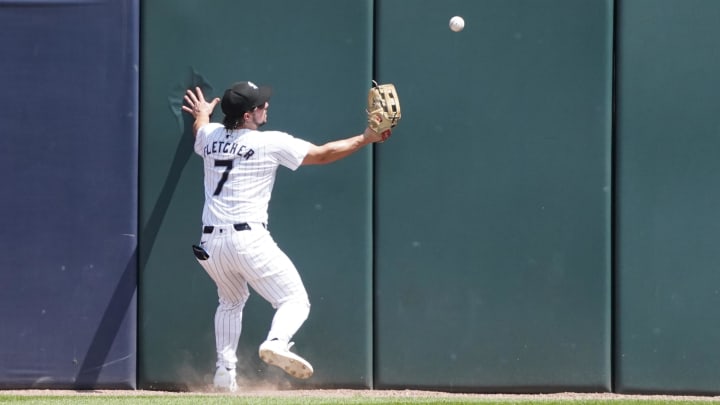SI:AM | The White Sox Are Chasing the Wrong Kind of History

Good morning, I’m Dan Gartland. Let’s take a break from talking about the best athletes in the world to look at perhaps the worst baseball team ever.
In today’s SI:AM:
🇫🇷 Marchand’s historic night
🇳🇴 The Olympics’ muffin man
🇩🇪 Goodbye to a tennis star
Bad times on the South Side
As the calendar flips to August, MLB’s playoff races are beginning to take shape. But there’s another, very different chase that will also be worth paying attention to in the season’s final two months.
After Wednesday’s 10–3 home loss to the Kansas City Royals, the Chicago White Sox have now lost 17 games in a row and are a staggering 27–84 on the season.
You don’t have to be a baseball historian to recognize that that’s a god-awful record. It’s so bad, in fact, that it puts the White Sox on pace to lose more games than any team in modern baseball history. Their current winning percentage is .243. Yes, they’ve won less than a quarter of their games this season. Over the course of a full 162-game season, that works out to a record of 39–123.
Unless Chicago turns things around quickly, it has the potential to become the worst team in baseball’s modern era. The 1962 New York Mets currently hold the record for futility, going 40–120 (.250 winning percentage) in their first season in existence. Only two teams in the history of the game have been worse: the 1917 Philadelphia Athletics, who went 36–117 (.235 winning percentage), and the 1899 Cleveland Spiders, who went 20–134 (.130 winning percentage).
The White Sox might not be as horrendous as that Spiders team, but just the fact that they’re in position to lose more games than any team in the last 125 years is remarkable given where the team stood just a few years ago. Chicago won the AL Central in 2021 with a 93–69 record and appeared to have a solid core of players who could lead them to sustained success—guys like Tim Anderson, Lucas Giolito, Michael Kopech, Yoán Moncada, Luis Robert Jr., Eloy Jiménez and Dylan Cease. But some of those players were traded away. Others were injured or underperformed. At the same time, the Sox failed to replace aging veterans like José Abreu and Yasmani Grandal, and the decline began.
Now, after the trade deadline, the White Sox find themselves with an even worse roster than the one that got off to this historically bad start. Starting shortstop Paul DeJong was traded to the Kansas City Royals. Jiménez, the team’s primary DH, was sent to the Baltimore Orioles. The Los Angeles Dodgers got closer Michael Kopech. Chicago’s next most reliable reliever, Tanner Banks, was traded to the Philadelphia Phillies. Outfielder Tommy Pham, one of only two White Sox regulars with an OPS above league-average, and Erick Fedde, who had the best ERA of any Chicago starting pitcher, were sent to the St. Louis Cardinals.
If the White Sox are going to avoid making unfortunate history as the worst team in baseball’s modern era, their depleted roster is going to have to be even better over the remaining 51 games than the team was before it dealt away so many top players. They’ll have to go at least 16–35 down the stretch in order to finish with fewer losses than the 1962 Mets. That doesn’t sound too bad, right? That’s a .314 winning percentage, 44 points worse than the next-worst team in baseball has been this season (the 39–70 Colorado Rockies). But that’s a monumental task for the White Sox. Even before their current 17-game losing streak, they had a .287 winning percentage. That’s a tough hill to climb.
The best of Sports Illustrated
- Here is Mitch Goldich’s daily guide for what to watch at the Olympics.
- The biggest story at the Olympics on Wednesday was French swimmer Léon Marchand becoming the first swimmer in more than a century to win two gold medals in a single day. Pat Forde has more on Marchand’s incredible night.
- Forde also wrote about Keaton Jones, the American swimmer who has a chance to medal in the 200m backstroke on Thursday, and how he’s also an elite ice swimmer.
- A Norwegian swimmer is also becoming a star of these Olympics, but because of his love for the Olympic Village’s chocolate muffins. Stephanie Apstein spoke to Henrik Christiansen about his love of those baked goods.
- Chris Mannix thinks the U.S. men’s basketball team’s dominant win over South Sudan showed that Team USA is a juggernaut again.
- Jon Wertheim reflects on the career of Angelique Kerber, who is retiring after her impressive run in the Olympic women’s singles tournament.
- Patrick Andres has a list of 10 sports that should be considered for future Olympic Games.
- CM Punk was the guest on Jimmy Traina’s latest SI Media podcast.
- Steve Kerr explained why he kept Joel Embiid on the bench for the entire game against South Sudan.
- Everyone is talking about Turkey’s extremely nonchalant silver medalist in pistol shooting.
- The Buccaneers are making Tristan Wirfs the highest-paid offensive lineman in NFL history.
The top five…
… things I saw yesterday:
5. Nestor Cortes’s bizarre delivery.
4. USWNT midfielder Korbin Albert’s first international goal—a lightning bolt from outside the box.
3. Jackson Holliday’s first MLB home run—a grand slam.
2. Léon Marchand’s late surge to win the 200m butterfly.
1. Katie Ledecky’s absurd margin of victory in the 1,500m freestyle.
